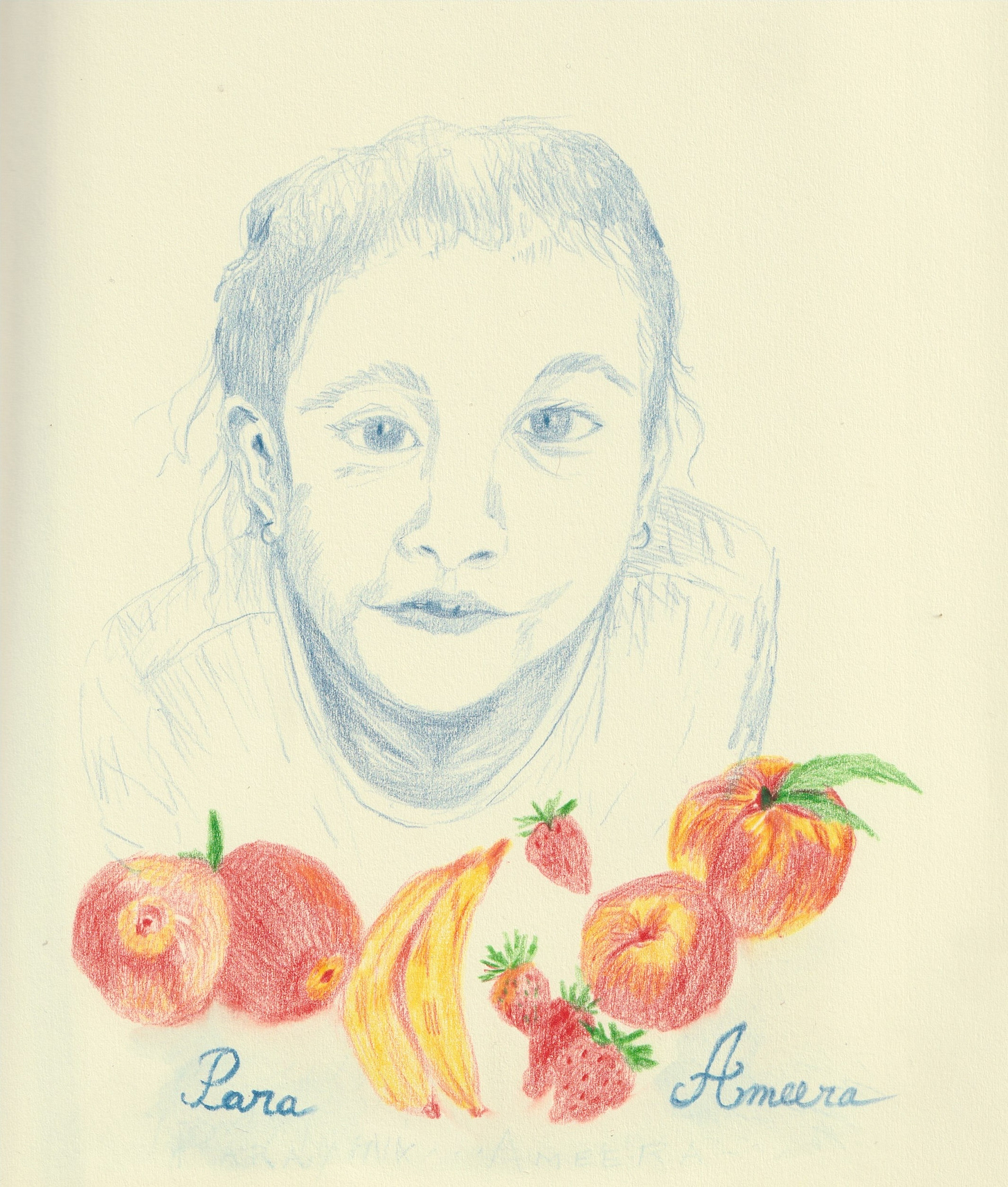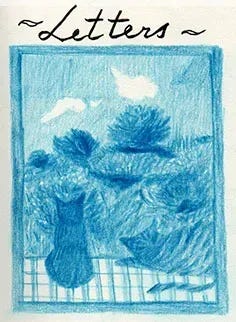Dezembro/December
texto de Ana Rita Fernandes e desenho de Débora Figueiredo/ written by Ana Rita Fernandes and drawing by Débora Figueiredo
Dezembro
Desordenadas reflexões natalícias.
O vídeo, reel ou TikTok, não sei, mostra uma miúda palestiniana, a Ameera, de 7 anos, que carrega garrafões de água por umas escadas acima. Quando lhe perguntam o que deseja naquele momento, ela lista frutas, paz, escola — coisas simples, que não deviam ser desejos, mas realidades adquiridas.
Histórias como esta, com crianças no meio de guerras, lembram-me sempre Ifigénia, sacrificada para que uma guerra pudesse ter lugar. Mas não me apetece contar a história de Ifigénia, nem da importância que o filme de Michael Cacoyannis tem para mim.
Apetece-me antes contar a história de outra criança — não aquela cujo hipotético aniversário se celebra entre os cristãos este mês, mas outra que lhe é semelhante.
Krishna foi escondido pelos pais de um rei tirano que já havia matado os seus irmãos, porque estava escrito que um filho de Vasudeva e Devaki (os pais de Krishna) um dia destronaria o tirano. E voltamos à matança dos inocentes. Para sua proteção, Krishna foi confiado à fiel Yashoda, que o criou juntamente com os seus filhos.
Conta a lenda que, um dia, enquanto Krishna brincava com os seus irmãos adotivos, um deles foi dizer a Yashoda que Krishna tinha comido terra. Yashoda foi ter com a criança, que afirmou e reiterou não ter comido terra. Yashoda insistiu, lembrando-o dos perigos de comer terra.
Farto de não ser acreditado, Krishna abriu a boca para mostrar à ama que não tinha comido terra. O que aconteceu a seguir é difícil de abarcar: ao olhar para a boca de Krishna, Yashoda viu o Universo — o Princípio e o Fim, o Absoluto, a Verdade, o Belo, o Justo e o Amor. Krishna teve de apagar a memória da pobre Yashoda antes que ela enlouquecesse completamente, restando nela apenas um Amor Incondicional.
Poderia dizer-se que todas as crianças — como todos os adultos que lhes sucedem — contêm em si o Universo. Todos, uma vez nascidos, são únicos e insubstituíveis.
Então, porque aceitamos a guerra? A fome? Porque aceitamos isto e as pequenas crueldades quotidianas, como esse clássico do mundo laboral e dos recursos humanos: "Ninguém é insubstituível"?
Como assim? Todos somos únicos.
Quando afirmamos e aceitamos o contrário, permitimos a destruição do Universo-em-cada-um. E sacrificamos Ifigénia outra vez, para que o Capital e a Morte possam triunfar.
December
Disordered Christmas reflections.
The video, reel, or TikTok, I’m not sure, shows a Palestinian girl, Ameera, aged 7, carrying jerrycans of water up some stairs. When asked what she wishes for in that moment, she lists fruit, peace, school — simple things that shouldn’t be wishes but basic realities.
Stories like this, with children caught in the middle of wars, always remind me of Iphigenia, sacrificed so that a war could take place. But I don’t feel like recounting Iphigenia’s story, nor the importance that Michael Cacoyannis’ film holds for me.
Instead, I feel like telling the story of another child — not the one whose hypothetical birthday Christians celebrate this month, but another who bears some resemblance.
Krishna was hidden by his parents from a tyrant king who had already killed his siblings, for it was foretold that a son of Vasudeva and Devaki (Krishna’s parents) would one day overthrow the tyrant. And here we are again, at the slaughter of the innocents. For his protection, Krishna was entrusted to the faithful Yashoda, who raised him alongside her own children.
Legend has it that one day, while Krishna was playing with his foster siblings, one of them ran to Yashoda, saying that Krishna had eaten dirt. Yashoda went to the child, who insisted repeatedly that he hadn’t eaten dirt. Yashoda pressed on, warning him of the dangers of eating dirt.
Tired of not being believed, Krishna opened his mouth to show Yashoda he hadn’t eaten any. What happened next is almost impossible to grasp: as Yashoda looked into Krishna’s mouth, she saw the Universe — the Beginning and the End, the Absolute, Truth, Beauty, Justice, and Love. Krishna had to erase the poor woman’s memory before she lost her mind completely, leaving only Unconditional Love within her.
It could be said that all children — like all the adults they grow into — carry the Universe within them. Each one, once born, is unique and irreplaceable.
So, why do we accept war? Hunger? Why do we accept this and the small daily cruelties, like that classic line from the corporate world and HR departments: “No one is irreplaceable”?
What does that even mean? We are all unique.
When we affirm and accept otherwise, we allow the destruction of the Universe-in-each-of-us. And we sacrifice Iphigenia once again, so that Capital and Death may triumph.






Happy New Year! Looking forward to more of your artwork and writing in 2025!